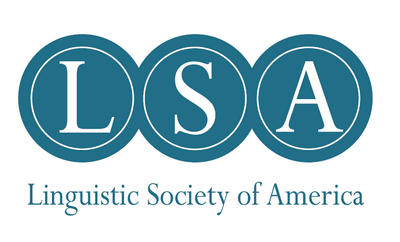Recent news
Awards for Kellogg, Kpogo, Ray
Congratulations to PhD students Jackson Kellogg, Felix Kpogo, and Jupitara Ray on their recent awards and fellowships!
- Jackson received a 2024-25 Foreign Language and Area Studies (FLAS) Fellowship to support his study of Amharic.
- Felix received a 2024 Graduate Student Award from the BU Center for the Humanities.
- Jupitara received a Graduate Research Abroad Fellowship (GRAF) from the BU Graduate School of Arts & Sciences to support her summer dissertation research.
Kudos to all!
Kpogo to Brown
We're thrilled to announce that our own Felix Kpogo has accepted a two-year Presidential Postdoctoral Fellowship at Brown University, where he will be based in the Linguistics Program. Congratulations, Felix! We're so proud!

Chang at Lund U.
This week, Prof. Chang will be giving a talk in Lund University's Centre for Languages and Literature seminar series on March 15. The title of his talk is "Knowledge of language(s) in multilingual contexts".
Chang & Yao in CUP volume
A paper entitled "An individual-differences perspective on variation in heritage Mandarin speakers" (Chang & Yao, 2024) has been published by Cambridge University Press in the book The Phonetics and Phonology of Heritage Languages (edited by Rajiv Rao).
Abstract: This chapter takes an individual-differences perspective on the dual sound systems of American heritage speakers (HSs) of Mandarin Chinese. Based on detailed sociodemographic data and production data on segmentals and suprasegmentals, we build holistic demographic and phonetic profiles for HSs, as well as native speakers and late learners, to explore how different aspects of their two languages (Mandarin, English) may develop in relation to each other and how individual variation in production may be related to socio-demographic factors. Using multiple factor analysis (MFA), we describe the range of these profiles, identify clusters of variation defined by different sociodemographic factors, and argue that some factors (e.g., age of arrival, language(s) spoken at home) have more predictive power for phonetic profiles than others. Overall, our results suggest a significant, if limited, link between socio-demographic factors and production, but only in Mandarin. We conclude by discussing the advantages and disadvantages of group-based and individual-centered approaches.
This study followed Open Science practices, and all materials, data, visualizations, and code are publicly accessible via the Open Science Framework at https://osf.io/u4w2g/.
Congrats to UROP recipient Maddie Jin
Congratulations to sophomore Linguistics minor Madelyn (Maddie) Jin, who was awarded an Undergraduate Research Opportunities Program (UROP) grant to work on linguistics research in Spring 2024! Below is a brief description of the project she will be working on:
- Maddie Jin: “The impact of speech rhythm in the production and perception of Asian-ness in American English”
In Spring 2024, Maddie will conduct an acoustic study of Asian Americans' interview speech in English to examine aspects of their speech rhythm and the degree to which there are differences with respect to English speakers of other ethnoracial backgrounds.
Welcome to the Spring 2024 labbies!
Welcome to the seven new students who will be joining the lab this spring:
- Jade Ling Garstang (BU GRS ’25) is a first-year MA student in Linguistics. She is interested in language variation, speech perception, and Asian languages, particularly indigenous ones like the Japanese Ryukyuan languages.
- Madelyn (Maddie) Jin (CAS ’26) is a second-year student minoring in Linguistics and majoring in Computer Science. She is currently working on a UROP-funded project involving the speech rhythm of Asian-American English. Her broader interests include bilingualism, phonetics, and natural language processing.
- Iliad Nazari is a third-year undergraduate student in Linguistics at the University of Minnesota. He is very interested in Central Asian languages. His research interests are in phonetics, language acquisition, and the psycholinguistics of multilingualism.
- Jupitara Ray (GRS '25) is a fourth-year PhD student in Linguistics, broadly interested in phonetics and phonology, sociolinguistics, bi/multi-lingualism in the diasporic community, etc. A research fellow in the lab in Spring 2024, she is currently working on her dissertation prospectus on phonetic accommodation and drift of Indian English speakers in India and the US.
- Liza Sulkin (GRS ’26) is a third-year PhD student in Linguistics. Her research interests include fast speech phenomena in Slavic languages, tongue twister production in native and non-native speakers and sociophonetics of lesbian speech. Currently, she is working on an acoustic analysis of lesbian women’s spontaneous speech to examine differences in production based on speakers’ self-described gender presentation.
- Rebecca (Becca) Wheeler (BU GRS ’27) is a second-year PhD student in Linguistics completing a qualifying paper in the lab, tentatively entitled “Effect of non-native articulation rate on foreigner-directed speech production”.
- Xuehan (Annie) Xie (BU GRS ’24) is a first-year MA student in Linguistics. Her interests encompass the intersection of language acquisition, bilingualism/multilingualism, Mandarin phonology, and syntax.
And a warm welcome back to Jason and Sara!
Chang elected Full Member of ASA
Congratulations to Prof. Chang on being elected a Full Member of the Acoustical Society of America (ASA) by the ASA Executive Council!
Kellogg wins LSA Abstract Award
Congratulations to PhD student Jackson Kellogg, who received the 1st-Prize Student Abstract Award for the upcoming 2024 Linguistic Society of America (LSA) Annual Meeting! The title of his abstract is "A focus-controlled acoustic analysis of phrase- and word-level prosody in Amharic".

Chang at UF
Next week, Prof. Chang will be giving a talk in the University of Florida's Language and Brain series on December 1. The title of his talk (on joint work with Dr. Esther de Leeuw, University of Lausanne) is "Introducing ADAPPT: A theoretical framework for research on bilingual speech".
Kpogo at LangCog
Felix Kpogo will be giving a talk in Harvard's Language & Cognition (LangCog) series next week (November 28)!